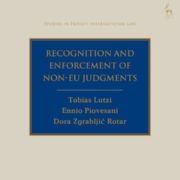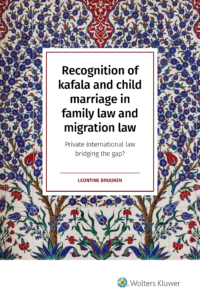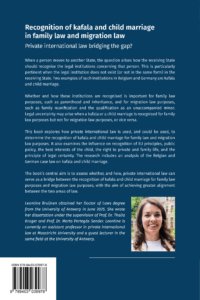Hart Publishing, Oxford, UK is proud to announce the release of Private International Law in BRICS: Convergence, Divergence, and Reciprocal Lessons co-edited by Dr. Stellina Jolly, South Asian University, Delhi, India, and Professor Saloni Khanderia, O.P. Jindal Global University, Sonipat, India. The book forms part of Hart’s prestigious Private International Law Series with Professor Paul Beaumont, University of Stirling, as its Series Editor.
Authored by leading scholars and practitioners in private international law, the chapters draw on domestic legislation and case law interpretations in each of these emerging economies. They cover a wide array of topics, including contractual and non-contractual obligations, choice of court agreements, and personal matters such as marriage, divorce, matrimonial property, succession, and surrogacy—all within the context of increased cross-border movement of people.
As the title suggests, this book explores the intricate landscape of private international law within the BRICS countries—Brazil, Russia, India, China, and South Africa. Divided into six sections, each part of the book offers a thematic analysis of core private international law-related questions and an in-depth examination of the reciprocal lessons each BRICS country can share concerning each of three core conflict of law issues – the international jurisdiction of courts, the applicable law and the effectiveness of foreign decisions (both judgments and arbitral awards) overseas.
This book serves as an invaluable comparative resource for governments, legislators, traders, academics, researchers, and students interested in the intricate legal dynamics at play within the BRICS nations. With the BRICS countries collectively representing around 42% of the world’s population and approximately 23% of global GDP, the need for enhanced legal cooperation and harmonization is more critical than ever. Over the past decade, cross-border interactions within the BRICS bloc and beyond have escalated significantly. However, the diversity in political, legal, economic, and social structures, coupled with the lack of geographical proximity and historical connections, has posed challenges to effective cooperation and the ability of BRICS to play a proactive role in global governance. The 15 BRICS Summits held between 2009 and 2023 have primarily focused on economic cooperation, particularly in trade, investment, foreign affairs, and innovation. While these areas are crucial, they cannot be viewed in isolation. Increased trade and cooperation inevitably lead to the movement of persons, goods, and services across national boundaries, raising important legal questions. For instance, economic cooperation that facilitates the movement of people also impacts personal relationships. Scenarios such as marriage, divorce, adoption, surrogacy, and inheritance across borders create complex legal challenges that require a robust understanding of private international law. Will a marriage or divorce be recognized in the home country? How will the nationality of a child born through surrogacy or adopted abroad be determined? These questions, though critical, have not yet been thoroughly examined in the context of BRICS.
Recognizing this gap, our book seeks to explore and analyze the role of private international law in fostering enhanced cooperation among BRICS countries. In pursuit of its objectives, the project draws lessons from various multilateral and supranational instruments operating under the HCCH – Hague Conference on Private International Law and in the European Union, renowned for pioneering clear, predictable rules to regulate international disputes through the unification of laws.
Details of the book as well as purchase options can be found here!




